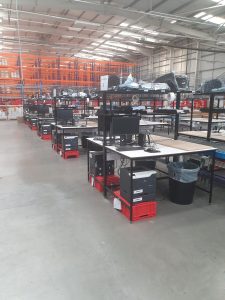Your basket is currently empty!

One way for a retailer to expand is through marketplaces, where third-party companies sell products. Joules is an example of a fashion retailer that has successfully launched its Friends of Joules marketplace.
Amazon established the marketplace model, allowing independent sellers to add their products to the Amazon catalogue, either shipping the products themselves or delivering their inventory to an Amazon warehouse for dispatch from there. Amazon charges a fee for every marketplace sale.
It may seem that an advantage of a marketplace for retailers is that they do not need any extra storage capacity if third-party sellers dispatch orders, but this is not usually the case. One effect of offering customers more choice through a marketplace is that sales of the market owners’ own lines will increase. A fashion retailer like Joules will have to purchase more heavy duty garment rails and storage racks for its warehouse to cope with this extra demand.
Kerry Lee was a consultant for the development of the Joules marketplace. Speaking to the Retail Gazette, she explained the Joules strategy:
“Joules do bits and pieces in homeware, but it only had a small range. The marketplace enabled the retailer to extend its home range and become more of a destination for homeware with minimal risk.”
Lee added that extending the product range encourages customers to make more regular purchases.
If a retailer has many online customers, it could be a good idea to open a marketplace to grow the business by offering complementary high-quality goods from third-party sellers.
You may also interested in:

How repairing damaged warehouse equipment beats replacing entirely
A White Paper by Southgate Global has detailed how repairing warehouse equipment instead of
Warehouse operators warned about energy compliance crisis
New energy regulations could render some warehouse space unusable by 2030 due to
